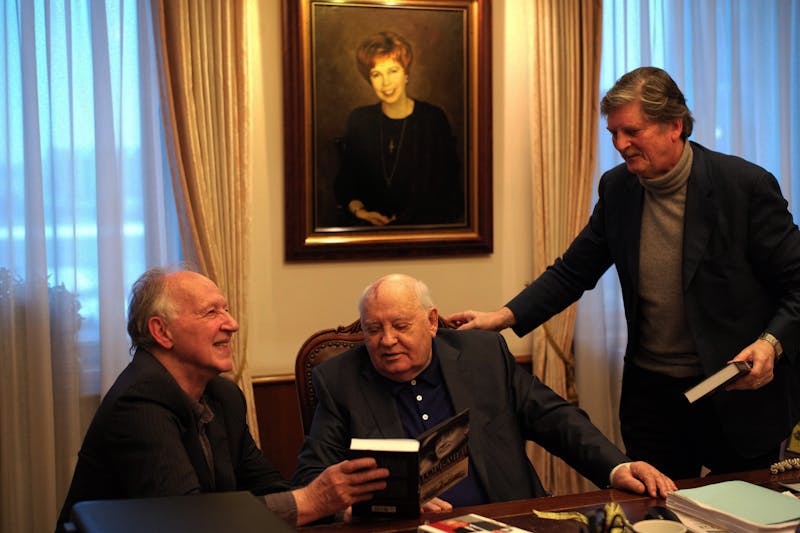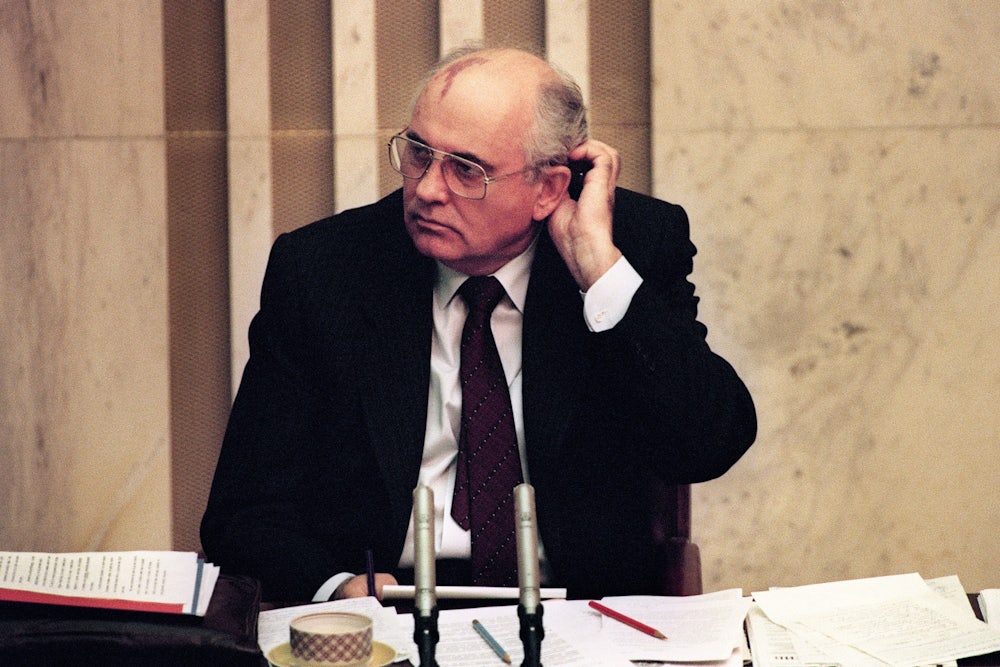Werner Herzog is in love. His eyes glimmer, his smile is unforced, and his much-parodied Teutonic drone cannot conceal his affection for his subject, the ailing 87-year-old man who once ruled the largest country on earth and then presided over its dissolution. In Mikhail Gorbachev, Herzog has found a secular saint, a man who was a titan in an age when the world felt briefly hopeful, and a helpless bystander to the 30 years of bitter disappointments that followed.
Meeting Gorbachev, Herzog’s new documentary (co-directed with André Singer), is based on three long interviews with the Soviet Union’s final leader. As a historical figure, Gorbachev is difficult to categorize. To the generation of idealistic liberals who came of age in the United States and Europe in the late 1980s, Gorbachev was and to some extent still is revered, a figure who can plausibly be mentioned in the same breath as Nelson Mandela as an icon of peace and reconciliation. But whereas Mandela remains a beloved figure in South Africa even after his death, today many Russians despise Gorbachev, and most hardly think of him at all. Gorbachev’s central achievement is a paradox: He rescued humanity from the brink of destruction and liberated millions out of an earnest desire to save Soviet socialism, but instead of saving it, he lost control of it and watched it collapse. By his own metrics, and those of so many of his countrymen, his career was a catastrophic failure.
All the same, it’s hard not to admire Gorbachev. His life story, as recounted hagiographically by Herzog, is one that at first glance seems to validate the Soviet system. Gorbachev was born in 1931 in the southern Russian village of Privolnoye, which Herzog visits and describes as a godforsaken place. As a child, he endured both famine and Nazi occupation, and for a period of several months in 1942, he wrongly believed his father to be a casualty of war. After the war, he became involved in the Komsomol, the Soviet youth league, and excelled at both school and farm work. He made his way to Moscow State University, the Soviet Harvard, where he met and married Raisa Titarenko, with whom he would go on to enjoy 46 years of happy marriage until her death in 1999. After university, he returned to the provincial capital of his home region, Stavropol, where he enjoyed a rapid rise in the Communist Party, modernized the local agricultural economy, and drew the attention of the Party leadership in Moscow. His early years, in short, present an uninterrupted meritocratic rise from the most humble beginnings, almost a mirror image of the American Dream, and an implicit credit to a political system premised on rule by the proletariat.

However, the Soviet Union that Gorbachev came to lead was in rough shape, plagued by corruption, stagnation, and an ailing leadership. Between 1982 and 1985, the Communist Party lost three consecutive general secretaries: Leonid Brezhnev at 75, Yuri Andropov 15 months later at 69, and Konstantin Chernenko 13 months after that at 73 (Herzog captures this sequence with his characteristic morbid humor, incorporating archival footage of Chernenko being propped up, Weekend at Bernie’s-style, by Party apparatchiks). At this point, Gorbachev, an energetic and appealing 54-year-old, took the reins of the Party and the Soviet nuclear arsenal, which, over the next several years, he would substantially scale back through bilateral negotiations with Ronald Reagan. He would also introduce the policies of glasnost (“openness”) and perestroika (“restructuring”) in order to liberalize the Soviet system, creating room for dissenting viewpoints and artistic experimentation as well as economic modernization. And in 1989, he would fatefully refuse to intervene to stop a wave of peaceful revolutions across Eastern and Central Europe, culminating in the fall of the Berlin Wall and the withdrawal of the Soviet Army from half a dozen satellite states that had been occupied since World War II.
It’s worth digressing for a minute to talk about Herzog, who was born in Bavaria in 1942 at the height of the war, and who, like Gorbachev, experienced poverty, military occupation, and general devastation in his early childhood. Herzog grew up and made his career as a filmmaker in West Germany, and the fall of the Berlin Wall was a triumphant moment for him, an expression of human liberation that led to the swift and peaceful reunification of his country. Between that and his passion for denuclearization—at one point, he takes us to Reykjavík to admire two Norwegian tourists reenacting the handshake between Gorbachev and Reagan that led directly to historic arms treaties—it’s clear why Gorbachev is an inspiration to Herzog. “We love you,” he tells his subject at one point, and he seems to be speaking not only for himself or for Germans but for the entire Western world.
But Gorbachev’s legacy doesn’t end in 1989. In 1991, Soviet hardliners staged a coup while Gorbachev vacationed in his Crimean dacha. While the coup quickly failed, it discredited the Party further and gave the leaders of the constituent Soviet republics, above all Boris Yeltsin in Russia, an opportunity to consolidate their own power. By the end of the year, Gorbachev was forced to sign the Soviet Union’s death warrant. Herzog captures how he refused to make a big media spectacle of this; dignified to the end, he concluded the Soviet experiment with visible irritation rather than a somber eulogy.
The next several decades have not gone smoothly at all—almost every former Soviet republic is either autocratic or a corrupt and dysfunctional democracy run by oligarchs and marked by extreme inequality. Herzog doesn’t dwell on any of this, offering just a single shot of Vladimir Putin at Raisa Gorbacheva’s funeral. But he makes clear that Gorbachev is himself a deeply disappointed figure, one who knows his country has forgotten him and the high ideals he tried to realize. When Herzog asks Gorbachev how much he misses Raisa, Gorbachev says his life ended with hers, 20 years ago now. It’s an achingly sad moment from what we’ve come to realize is an achingly sad man.
Herzog doesn’t offer a materialist or ideological analysis of the transition from Soviet socialism to anarchic neoliberalism. The story he tells is resolutely individualist, a tragedy centered on a great man. Besides Gorbachev, he offers interviews with the men (they are all men, aside from some archival footage of Margaret Thatcher) who helped end the Cold War, including Lech Wałęsa, James Baker, and George Schultz (fresh from his appearance in another recent documentary as one of several powerful old men duped by Elizabeth Holmes of Theranos). Overall, the story he tells goes something like this: Gorbachev, with the purest intentions, tried to reform communism and bring about world peace, but was undermined by other, more cynical men, who replaced the Soviet Union with something worse.
Left unexplored is whether the Soviet system, as it stood when Gorbachev inherited it in 1985, was worth saving, and whether it could have been saved without the kind of state violence Gorbachev was uniquely unwilling to use. Both his Soviet predecessors and his Russian successors employed domestic repression and military force to assert Moscow’s control of its subjects, whereas Gorbachev, one of history’s great peacemakers, withdrew from Afghanistan and the Eastern bloc and let nationalist movements from the Baltics to the Caucasus tear at the foundations of the Soviet state, though he regretted and continues to regret the last part. This is the central contradiction of Gorbachev’s story: After achieving immense power, his gift to humankind was to decline to wield it and to give it up without much fuss.
Gorbachev, the first and only Soviet leader born after the 1917 Revolution, educated and shaped under Stalinism, believed in a social democratic vision for his country. In a way, he was trying to take the Soviet Union to the same destination Bernie Sanders wants to take the United States from the opposite direction: to do something like what the Nordic states have achieved for their citizens. It was a noble vision, and one he completely failed to realize. For the West’s Cold Warriors, Gorbachev’s legacy is an honorable surrender to the free market; for Russians, it’s a national humiliation, one that Russia’s more recent military adventures in Ukraine, Georgia, and Syria are meant in part to reverse.
As for Herzog, his understanding of Gorbachev’s eventful life is both awestruck and surprisingly conventional, but at a few points his talent for recognizing the absurd comes through. As he describes the opening of Hungary’s western border, which preceded the fall of the Berlin Wall, he shows us the evening newscast in Austria that night. The lead story was about how to kill garden slugs with beer, and while that could have been a brief amusing aside, Herzog takes a minute to tell the audience in some detail about slugs, in the same flat affect that he later uses to discuss the threat of nuclear war. It’s a deeply weird moment, and what Herzog seems to be telling us is that history is made up of such moments, beyond the control of great men or the calculations of vast bureaucratic states.
